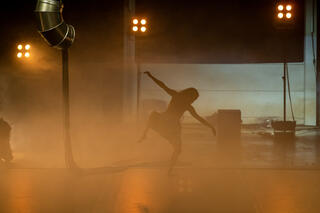What sound does falling produce, what sound is getting up? What velocity does buzzing have, and what momentum do we find in singing? How can we touch each other, physically and acoustically? Together with three dancers and two sound designers, Daniela Georgieva’s Fluscia starts a sensual exploration of the rapport between the performers and their relation to the audience: “An impressive dance piece” (Der Standard), with the interplay of the dancers’ voices with electro-acoustic compositions at its centre.
Fluscia as a piece continues Daniela Georgieva’s earlier piece 270206, which premiered at Kunsthalle Düsseldorf in 2022, in collaboration with her colleague Hugo le Brigand: In Fluscia, they both expand their examination and experiences with forms of physical intimacy and distance with an acoustic dimension. They explore which contact and relations are possible between different bodies – movement bodies, acoustic bodies, affective bodies. Out of this emerge new bodies and new constellations wherein the interplay of the dancers’ embodied voices with electronic sounds form Fluscia’s core.
“In Fluscia, dance’s articulation in interrelation with music pushes to the fore. (…) As a neologism, the title Fluscia is reminiscent of both the art movement Fluxus as well as the fascias, connective tissue within the body. In separate scenes, the dancers practice a Dadaistic shattering of language; two performances by Tanja Fuchs as a singer thwarts the solemnity as a component of the communal insurrection against the impending crash. (…) This results in an impressive dance piece.” (Helmut Ploebst: Der Standard)
Daniela Georgieva comes from Bulgaria, lives and works in Düsseldorf. Since her studies at Kunstakademie Düsseldorf as a master student in A.R. Penck’s class, she has been working in the fields of visual arts, music, performance, and dance. She realised solo exhibitions and solo projects but was also part of several group exhibitions, among them some at Kunsthalle Düsseldorf and at Kunstverein für die Rheinlande und Westfalen Düsseldorf as well as at Amerikahaus München. She received the City of Düsseldorf Support Grant in 2009 and a 2012 stipend of the Berlin Academy of Arts in Olevano, Italy. She has been concentrating on dance and performance art exclusively since 2016, mainly realising solos and her own choreographies. Additionally, she has been working as a teacher for Performance and Gender at the Peter Behrens School of Arts in Düsseldorf since 2017. Together with her dance colleague Hugo Le Brigand, she collaborates on choreographies and founded the KOROLL association.
Duration: approx. 60 mins.
| Datum | Rahmenprogramm |
|---|---|
| Sat 21.02. 19:00 |
Physical Introduction with Sophie Czarnetzki |
|
Sat 21.02. subsequently |
Talk: Together with others |
Concept, choreography: Daniela Georgieva; choreography, dance: Hugo Le Brigand, Lina Venegas, Valentino Skarwan; dramaturgical support: Liv Schellander; outside eye: Lena Megyeri; sound design: Moritz Nahold, Tanja Fuchs; lighting design: Samuel Schaab; costumes, installation: Anna Sedlmayr // ANN[DONE; production management: Wibke Scheler.Special thanks to Eva Tacha-Breitling, Alberto Cisello.
Co-produced by brut Wien and Verein KOROLL. Supported by Im_flieger, Arbeitsplatz Wien, Seestadt Studios Wien.
With many thanks for the kind support of the Cultural Department of the City of Vienna, the Federal Ministry of Arts, Culture, Civil Service and Sport, and the Kunststiftung NRW.






